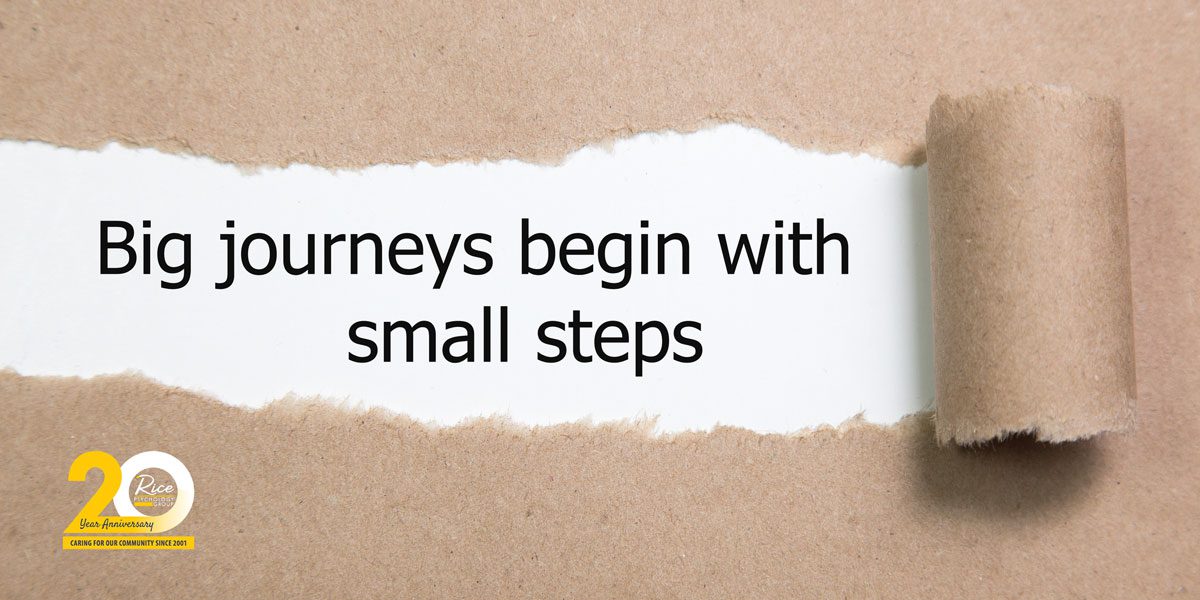Consider the following story as it relates to this week’s topic.
Each New Year’s Day, I set the same goals for myself: lose weight, exercise more, and quit smoking. However, by the end of January (if I even make it that far), my diet, lack of exercise, and smoking are worse than before! I continue to try throughout the year to change my behaviors, but things always end up the same, and I feel worse and worse about myself. It’s as though the harder I try, the bigger I mess up. How can I stick to my goals and finally make the changes that I know will make my life better in the long run?

How often do you decide to change something in your life like cutting down on junk food and screen time, exercising more, opening your mail on a regular basis (yup!), etc.? Do you find yourself giving up, forgetting, or deciding it’s just too hard? If you do, then you aren’t alone. The truth is that life’s changes don’t happen overnight.
Our licensed psychologists and therapists in Tampa know how hard it can be to make life changes and sticking to decisions that will bring these changes to light. That’s why we want to share some steps on helping you succeed.
Start Small
It’s easy to feel overwhelmed by the pressure to make changes. Not only can it leave us feeling anxious, but it can lead to major disappointment and low self-esteem.
Is there a way to make these changes easier without the emotional toll?
An NPR interview with B.J. Fogg, author of Tiny Habits: The Small Changes That Change Everything, describes how making small behavioral changes are easy to accomplish and can lead to greater success when we’re looking to change ourselves.
“It’s easier to create habits and change than most people think, and it’s faster than most people think,” Fogg says. “It can even be fun if you do it in the right way.” He goes on to say that, to begin making these small changes, one must have the motivation to change, the ability to change the behavior, and a prompt, or reminder, to behave a certain way at a certain time. And the harder the behavior or change is needed, the more each of these three traits is needed.
Setting the Bar Low
While we all try to do our very best, we sometimes set unrealistic goals for ourselves. That’s why our licensed psychologists and therapists believe that starting small, or “setting the bar low” for ourselves at first, can help in the long run.
Let’s say you want a healthier diet. If you completely change your current diet, then the next day will be hard. Instead, try using Fogg’s three steps to create long-term change.
First, write your goals down and how you plan to make them achievable. Stick this list on your refrigerator as a daily reminder. Second, stock your refrigerator with healthier food. And third, remind yourself to do small things to limit your food intake, like drinking a glass of water before a meal so you fill up faster and are less likely to overeat.
Rice Psychology Group would like to add one more step to Fogg’s list: celebrate. Yes, congratulate yourself on a job well done, no matter how small. Praise yourself out loud if you’d like. Share your accomplishments with friends and family. You might end up getting more positivity from them. When you feel good about yourself, you’re more likely to repeat positive behaviors. We’re such big believers in celebrating that it’s one of Rice Psychology Group’s core values!
Let’s Work Together
Please contact us any time to schedule your free, 10-minute consultation. We currently offer private, online sessions via telehealth as well as a limited number of telehealth and in-person evaluations for all ages.

